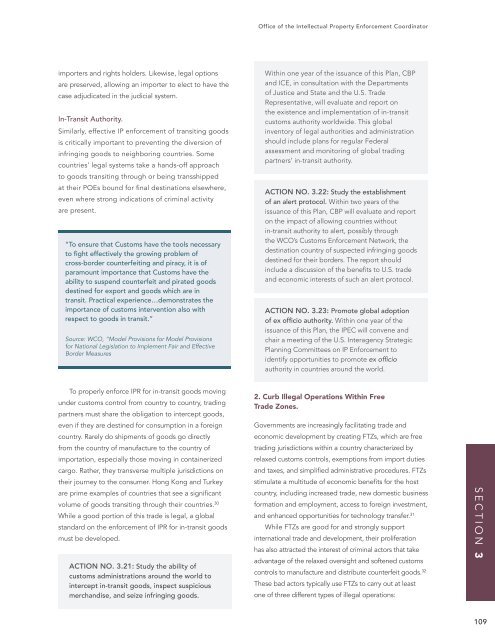ENFORCEMENT
eop_ipec_jointstrategicplan_hi-res
eop_ipec_jointstrategicplan_hi-res
You also want an ePaper? Increase the reach of your titles
YUMPU automatically turns print PDFs into web optimized ePapers that Google loves.
Office of the Intellectual Property Enforcement Coordinator<br />
importers and rights holders. Likewise, legal options<br />
are preserved, allowing an importer to elect to have the<br />
case adjudicated in the judicial system.<br />
In-Transit Authority.<br />
Similarly, effective IP enforcement of transiting goods<br />
is critically important to preventing the diversion of<br />
infringing goods to neighboring countries. Some<br />
countries’ legal systems take a hands-off approach<br />
to goods transiting through or being transshipped<br />
at their POEs bound for final destinations elsewhere,<br />
even where strong indications of criminal activity<br />
are present.<br />
“To ensure that Customs have the tools necessary<br />
to fight effectively the growing problem of<br />
cross-border counterfeiting and piracy, it is of<br />
paramount importance that Customs have the<br />
ability to suspend counterfeit and pirated goods<br />
destined for export and goods which are in<br />
transit. Practical experience…demonstrates the<br />
importance of customs intervention also with<br />
respect to goods in transit.”<br />
Source: WCO, “Model Provisions for Model Provisions<br />
for National Legislation to Implement Fair and Effective<br />
Border Measures<br />
Within one year of the issuance of this Plan, CBP<br />
and ICE, in consultation with the Departments<br />
of Justice and State and the U.S. Trade<br />
Representative, will evaluate and report on<br />
the existence and implementation of in-transit<br />
customs authority worldwide. This global<br />
inventory of legal authorities and administration<br />
should include plans for regular Federal<br />
assessment and monitoring of global trading<br />
partners’ in-transit authority.<br />
ACTION NO. 3.22: Study the establishment<br />
of an alert protocol. Within two years of the<br />
issuance of this Plan, CBP will evaluate and report<br />
on the impact of allowing countries without<br />
in-transit authority to alert, possibly through<br />
the WCO’s Customs Enforcement Network, the<br />
destination country of suspected infringing goods<br />
destined for their borders. The report should<br />
include a discussion of the benefits to U.S. trade<br />
and economic interests of such an alert protocol.<br />
ACTION NO. 3.23: Promote global adoption<br />
of ex officio authority. Within one year of the<br />
issuance of this Plan, the IPEC will convene and<br />
chair a meeting of the U.S. Interagency Strategic<br />
Planning Committees on IP Enforcement to<br />
identify opportunities to promote ex officio<br />
authority in countries around the world.<br />
To properly enforce IPR for in-transit goods moving<br />
under customs control from country to country, trading<br />
partners must share the obligation to intercept goods,<br />
even if they are destined for consumption in a foreign<br />
country. Rarely do shipments of goods go directly<br />
from the country of manufacture to the country of<br />
importation, especially those moving in containerized<br />
cargo. Rather, they transverse multiple jurisdictions on<br />
their journey to the consumer. Hong Kong and Turkey<br />
are prime examples of countries that see a significant<br />
volume of goods transiting through their countries. 30<br />
While a good portion of this trade is legal, a global<br />
standard on the enforcement of IPR for in-transit goods<br />
must be developed.<br />
ACTION NO. 3.21: Study the ability of<br />
customs administrations around the world to<br />
intercept in-transit goods, inspect suspicious<br />
merchandise, and seize infringing goods.<br />
2. Curb Illegal Operations Within Free<br />
Trade Zones.<br />
Governments are increasingly facilitating trade and<br />
economic development by creating FTZs, which are free<br />
trading jurisdictions within a country characterized by<br />
relaxed customs controls, exemptions from import duties<br />
and taxes, and simplified administrative procedures. FTZs<br />
stimulate a multitude of economic benefits for the host<br />
country, including increased trade, new domestic business<br />
formation and employment, access to foreign investment,<br />
and enhanced opportunities for technology transfer. 31<br />
While FTZs are good for and strongly support<br />
international trade and development, their proliferation<br />
has also attracted the interest of criminal actors that take<br />
advantage of the relaxed oversight and softened customs<br />
controls to manufacture and distribute counterfeit goods. 32<br />
These bad actors typically use FTZs to carry out at least<br />
one of three different types of illegal operations:<br />
SECTION 3<br />
109


